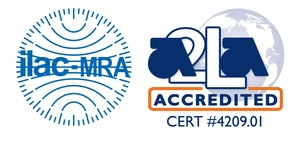Thermal Analyses of Plastics
Schedule: February, July
Reduced Price

Accredited Proficiency Testing Provider*
This program is accredited in accordance with the recognized International Standard ISO/IEC 17043: 2010 Conformity Assessment - General Requirements for Proficiency Testing, by the American Association for Laboratory Accreditation. Certificate Number: 4209.01
About The Program
ASTM International Proficiency Testing Center is pleased to offer a Proficiency Testing Program on Thermal Analyses of Plastics(TAP) to laboratories who need a statistical quality assurance tool that will enable them to improve and maintain a high level of performance in conducting ASTM Differential Scanning Calorimetry (DSC), Oxidative-Induction Time (OIT) by Differential Scanning Calorimetry and Thermogravametric Analyses of plastic resins. Interlaboratory comparisons will be made so that participants can compare their test results with other laboratory results worldwide.
The PTP is conducted twice annually. As a program participant, you will receive two plastic resin samples plus test instructions for each test cycle. Your laboratory performs the tests that you normally conduct within your own facility using the specified ASTM methods in the program scope. Single determinations by each laboratory are required, as the program does not allow the reporting of averages of replicate determinations.
Upon completion of tests, each laboratory electronically submits their PTP data to ASTM for use in generating statistical summary reports. Reports contain:
- Coded laboratory test results
- Statistical analyses of test data
- Charts plotting test results versus
- Other Statistics
Samples, test instructions and data report forms are distributed electronically to each participant on the date samples are distributed. Labs have approximately 8 weeks to submit test data with the final statistical summary reports being electronically distributed in approximately 25 days.
For more information, contact us.
Test Materials
Each participating lab will receive two different plastic resins in 5 gram quantities having a high and low melting point for each of the two test cycles conducted during the year. Resins to be evaluated in the program include LLDPE, PP, PBT, PPS and PFA. Test specimen kits are prepared and distributed for the ASTM-PTP program by Clark Labs in Jefferson Hills, PA.
Test Parameters
| D3418 | Polymers by Differential Scanning Calorimetry (DSC) |
| D3850 | Thermogravametric Method (TGA) |
| D3895 | Scanning Calorimetry (OIT by DSC) |
| E1131 | Thermogravimetry |
List of Methods are Subject to Change if program scope is expanded to include other thermal property tests.
Distribution Of Samples
Test samples are prepared and distributed by businesses hired for their expertise. Program registration fees include the cost of shipping the test samples.
Why Should Your Laboratory Participate?
ASTM's Proficiency Test Program provides you with:
- A useful and meaningful statistical quality assurance tool to monitor the strengths and weaknesses of your laboratory's performance in conducting testing.
- The resource you need to satisfy proficiency testing elements of laboratory accreditation.
- A periodic comparison of test results with other participating laboratories.
Should you have an issue with your published results, please write to ptp@astm.org with your lab number and account number.
Program Requirements
Participation is on an annual fee basis and open to all laboratories. Registration fees must be paid in advance to participate. Testing must be performed within the participant.s laboratory facilities. A laboratory does not need to perform all the program tests to participate.
About Astm International Committee D20 On Plastics
Committee D20 on Plastics, consisting of over 750 members, is a developer of 470 standards. The Committee provides the technical direction for the program. Test information from the program may be utilized by Committee D20 to determine if changes to the ASTM test methods are warranted. Data submitted to Committee D20 is coded by ASTM to maintain confidentiality.
